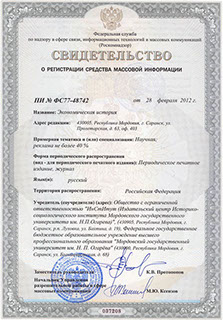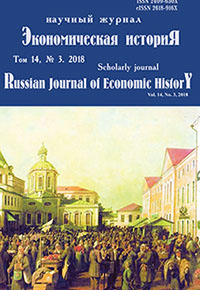Экономическая историЯ
Russian Journal of Economic History
ISSN 2409-630X (Print)
ISSN 2618-916X (Online)
Expert board:
- Scientific Council of RAS on economic history;
- Research and Educational Center «The economic history of Central Russia and the Middle Volga region» of Ogarev Mordovia State University;
- Center of Economic History of Lomonosov Moscow State University
Navigation
Certificate of registration

ISSN 2409-630X (Print), ISSN 2618-916X (Online)
DOI: 10.15507/2409-630X.042.014.201803.263-275
УДК 94
Viktor M. Arsentyev
National Research Ogarev Mordovia State University (Saransk, Russia),
e-mail: vicars@bk.ru
ORCID http://orcid/org/0000-0002-9828-7198.
MONETARY FORMS OF PAYMENT OF WORK IN THE RUSSIAN PATRIMONY INDUSTRY IN THE FIRST HALF OF THE XIX CENTURY (ON THE MATERIALS OF THE MIDDLE VOLGA REGION)
Introduction. The article is devoted to the consideration of changes which took place in the system of remuneration for work in the patrimonial industry of Russia in the first half of the XIX century. The methods of mobilizing of workers for industrial enterprises are considered, the value of the monetary form of payment for different categories of workers is characterized. The methods of labor stimulation applied by noblemen-industrialists with a view of increase of labor activity of workers and increase in labor productivity are investigated. Methods and Materials. When solving the set research tasks, materials from the funds of federal and regional archives, published sources, as well as scientific literature were used. To analyze the nature and direction of the processes that took place in the industry of serf Russia, the modernization theory was applied. When processing quantitative data, a statistical method was used, and for a more detailed immersion in the subject of the study, a micro-historical approach was applied. Results. The conducted research showed that capitalist experiments at the patrimonial enterprises of the Middle Volga region, connected with increasingly firmly established industry in the first half of the XIX century the tradition of applying monetary forms of labor for their own serf and household people, was used by many noble entrepreneurs in their industrial manufactures. The monetary forms of remuneration were methods of intensifying forced labor and were aimed at increasing the profitability of the patrimonial enterprises. Discussion and Conclusion. In the patrimonial industry of the Middle Volga region in the first half of the XIX century, the use of labor of serfs and household people was gradually transferred to a commercial basis, and only serfs were employed in the form of corvee labor for auxiliary servicing. While maintaining the connection with the land and legal dependence on the owner, the position of the working patrimonial manufactory acquired a dual character: on the one hand, elements of contractual employment relations were present on a market basis, and on the other, feudal features of forced recruitment were preserved. The statistical analysis of payroll data in patrimonial factories, mainly cloth, revealed significant differences in its size, depending on gender, age, professional specialization and skill level of workers. But in general, the size of the monetary payment of labor remained rather low. The absence of any formally fixed rates often allowed the factory owners, at their own discretion, to evaluate certain types of labor, and on this basis to compile the wage pay tables for industrial workers, the vast majority of whom were also in a state of non-economic coercion.
Keywords: early industrial modernization, workers, wages, industry, landlords, patrimonial manufactory, the Middle Volga Region.
For citation: Viktor M. Arsentyev. Monetary Forms of Payment of Work in the Russian Patrimony Industry in The First Half of the XIX Century (on the Materials of the Middle Volga Region). Ekonomicheskaya istoriya = Russian Journal of Economic History. 2018; 14(2): 263–275. (In Russ.). DOI: 10.15507/2409-630X.042.014.201803.263-275
© Ogarev Mordovia State University. History and Sociology Institute, 2017
68, Of. 411, Bolshevistskaya St., 430005, The editorial office of the scholarly journal «Russian Journal of Economic History»
Tel.: (8342) 24-25-90; 27-07-11, Fax: (8342) 24-25-90, E-mail: jurnal-econom-hist@isi.mrsu.ru
Designed by A. Napalkov, Email: napalkov@isi.mrsu.ru

